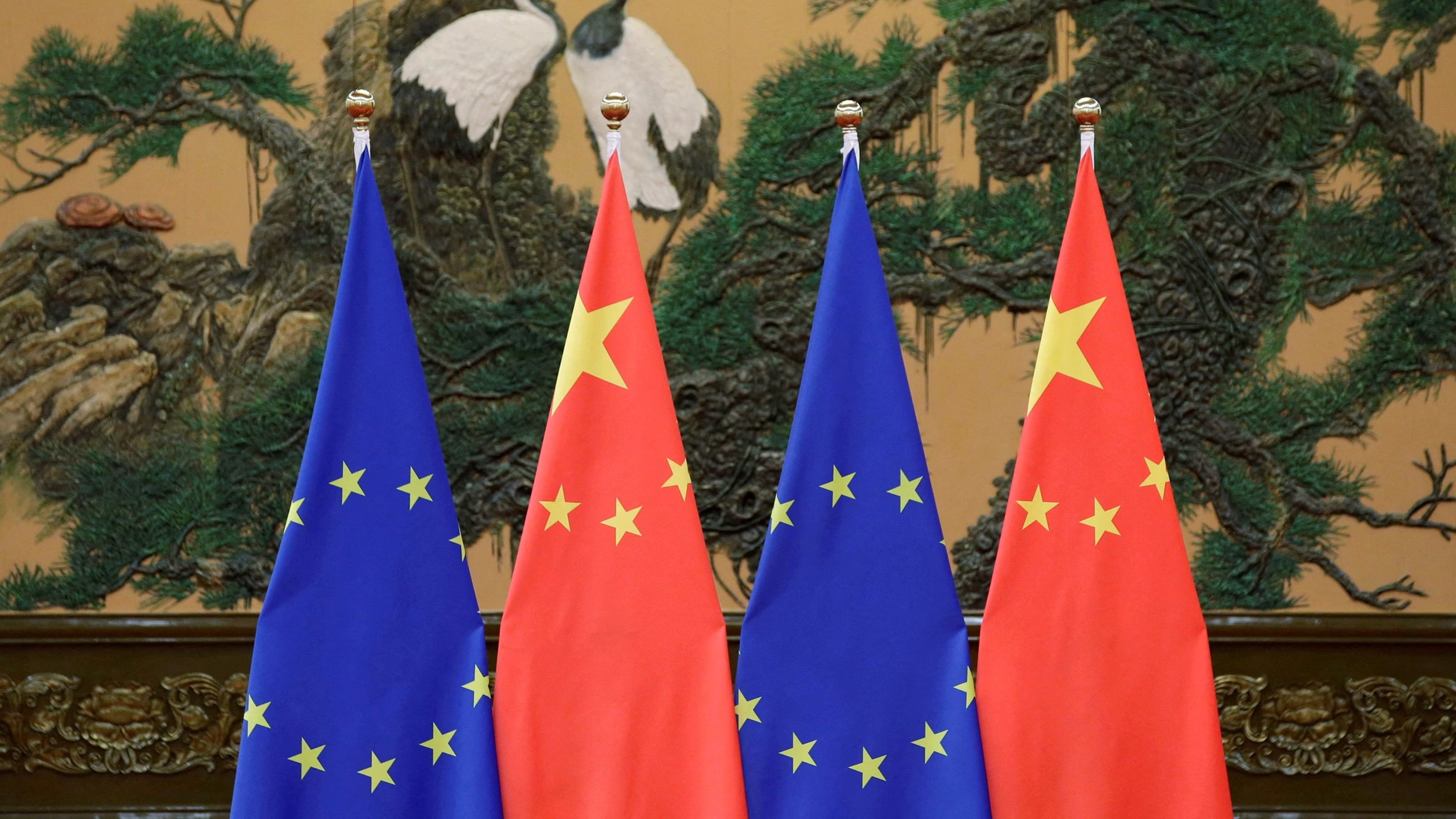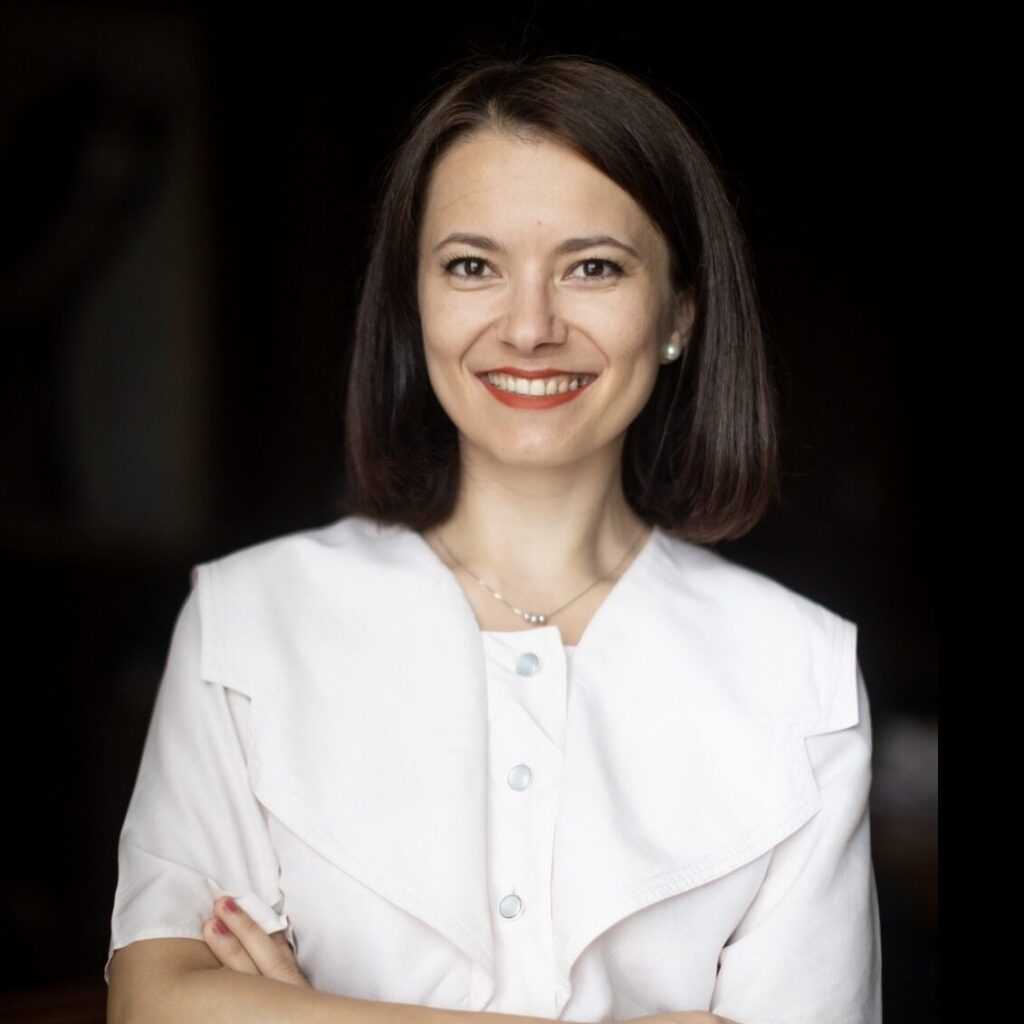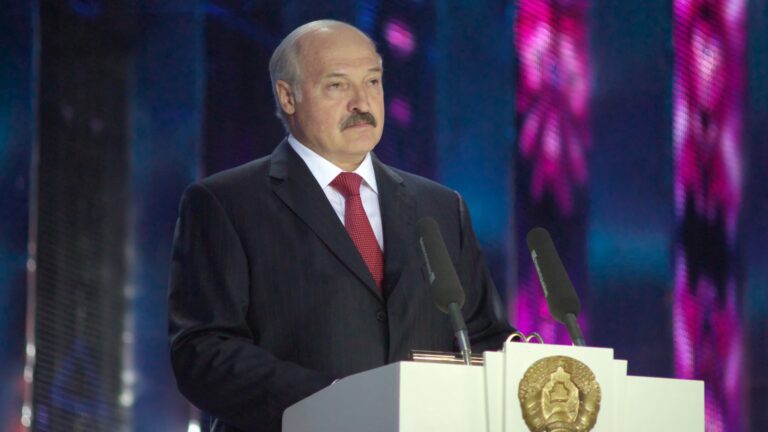
The 42nd meeting between the European Parliament’s Delegation for Relations with the People’s Republic of China and representatives of the National People’s Congress took place on October 16, 2025 – the first such meeting since 2018. Parliamentary exchanges had been effectively frozen since 2021, when the Chinese government imposed sanctions on several MEPs in response to the EU’s own human rights sanctions against Chinese officials and organizations. Amid reports of tense debates on topics ranging from the Russian war in Ukraine to the EU’s trade imbalance with China, we asked several analysts from our CHOICE network to share their insights.

Jeremy Garlick
Associate Professor, Department of International and Diplomatic Studies, Prague University of Economics and Business
Dialogue between the EU and China has been in a state of suspended animation since 2018, when the last inter-parliamentary meeting was held. The October 2025 meeting therefore represented a chance to revive relations through discussions about a wide range of political, economic, and even scientific topics. However, given the depth of past grievances, it was unlikely that either side would become friendly overnight. Many obstacles stand in the way of a cordial resumption of discourse.
From the EU’s perspective, there are longstanding concerns about China’s human rights record and its lack of democratic institutions (according to European norms). There are also accusations that the Chinese government is unfairly subsidizing its state-owned companies, allowing them to dump cheap goods onto the European market. The European insistence on emphasizing these issues has generally led to rhetorical counterattacks from the Chinese side, meaning that little progress has been made on matters of substance.
Seeing no way to make progress at the EU level, Beijing has pursued bilateral ties with individual member states. The Chinese Communist Party continues to court populist-led governments such as those in Hungary and Slovakia through promises of increased investments. For Brussels, this represents a form of divide-and-conquer strategy that it cannot tolerate. Yet it seems unlikely that Beijing will alter its approach to Europe, and no amount of pressure from the EU is going to make a difference.
For the Czech Republic, currently in transition to a new government, the renewal of EU-China dialogue presents something of a conundrum. The pro-Taiwan stance of recent years may be challenged if the EU decides to warm up its relations with Beijing. In addition, the form and direction of the incoming government’s China policy remain unclear. At any rate, President Petr Pavel will not look favorably on attempts to adopt a more pro-China stance. The path ahead will thus require careful thought to develop a position that supports Czech interests while not undermining EU unity.

Zsuzsa Anna Ferenczy
Visiting Fellow, Martens Centre & Adjunct Assistant Professor, National Dong-Hwa University, Hualien, Taiwan
As EU-China relations reach an “inflection point,” it is in Europe’s interest to maintain open channels of communication with Beijing. This is vital for the EU to better position itself amid heightened geostrategic rivalry. Parliamentary diplomacy can help the bloc voice concerns regarding the political and economic asymmetries in its relations with China. Reviving this exchange can also help set the EU apart from the contradictory positions of US President Trump on China, and help the bloc position itself more strategically.
That said, it was the European Parliament (five of its members, their families, and the Parliament’s entire Human Rights Committee) that bore the brunt of China’s retaliatory sanctions in 2021 – imposed in response to EU sanctions connected to the persecution of Uyghurs in Xinjiang. Although Beijing lifted these sanctions in April this year in an attempt to repair the damage, the road to reestablishing trust remains long. The big issues setting Europe and China apart – most notably the lack of a level playing field and limited market access – persist, which Beijing has shown no interest in addressing. Europe must therefore work harder for a breakthrough on these issues.
Topping the list of Europe’s concerns is China’s ongoing support for Russia’s aggression in Ukraine. As Commission President Ursula von der Leyen told Chinese leader Xi Jinping during their July summit in Beijing, China’s relationship with Russia is the “determining factor” in its relations with the EU. The summit, however, led to no change, and it now seems that the best thing about it was that it happened, keeping channels of communication open. A similar outcome was expected from the inter-parliamentary meeting.

Etienne Soula
Acting Manager for Europe and Research Fellow, German Marshall Fund (GMF)
From France’s perspective, the 42nd EU-China Inter-Parliamentary Meeting came at a sensitive moment in relations with China. The exchange between European and Chinese lawmakers, the first since 2018, took place as Beijing imposed anti-dumping tariffs on European brandy – hitting French producers particularly hard – and introduced new restrictions on rare earth exports, which could be particularly problematic for the EU’s top arms exporter. For Paris, the meeting offered a chance to let the EU absorb the most contentious issues while preserving space for bilateral dialogue focused on cooperation and economic stability.
Indeed, two very different meetings took place on October 16. In Beijing, the European delegation raised concerns about China’s support for Russia in Ukraine, human rights, and Taiwan. The European readout lamented that “competition and rivalry [were] increasingly […] overshadowing partnership” in EU-China relations. Media reports of the talks described EU lawmakers as “shocked” by their Chinese counterparts’ vehement rebuttals and dismissals of European concerns.
Meanwhile, in Hangzhou, Emmanuel Bonne – President Macron’s diplomatic adviser – held cordial talks with Foreign Minister Wang Yi as part of the 27th China-France Strategic Dialogue. According to the Chinese readout, the exchange emphasized reciprocity, predictability, and fair competition, with Wang urging France to promote a “right perception of China” and to support “true strategic autonomy” within the EU. In the absence of a French readout, external observers are left to wonder how firmly Bonne pushed back.
France is by no means the only EU member state to delegate confrontation to Brussels while reserving conciliation for bilateral channels. The day before his meeting with Bonne, Wang Yi met Spanish Foreign Minister Manuel Albares Bueno for another cordial exchange of views. Whether this division of labor ultimately strengthens European countries’ bargaining position vis-à-vis Beijing remains to be seen.

Jonathan Lehrer
Program Manager, Körber Stiftung
The EU-China Inter-Parliamentary Meeting marked a symbolic reset in relations between the European Parliament and the National People’s Congress after a seven-year hiatus. While the National People’s Congress is not powerful enough to influence decisions in Beijing’s power center, the more channels of communication both Europe and Germany have with Beijing, the better. Afterall, given Europe’s long list of concerns, dialogue is essential.
German interests – such as tackling Chinese industrial overcapacity and Beijing’s cooperation with Russia – are in line with broader EU priorities. However, there are no signs that China will back down on these issues. Concessions on overcapacity are as unlikely as any change in China’s stance toward Russia. For Beijing, maintaining control over its state-dominated economy outweighs the benefits of embracing free and fair competition. Similarly, controlling Putin and preserving its partnership with Moscow remains more valuable than building trust with Europe by curbing Russian war efforts in Ukraine.
The backbone of Germany’s economy – especially small and medium-sized suppliers to major manufacturers – faces mounting pressure from Chinese competition, while increasing Russian espionage heightens perceptions of military threat. The German government must address both issues, especially considering the upcoming China visit by German Foreign Minister Johann Wadephul at the end of October, which will be followed by Chancellor Merz.
It remains to be seen whether and how the renewed dialogue between the European Parliament and the National People’s Congress can yield tangible results. As China steps up its diplomatic outreach to Brussels, the guiding principle for the European Parliament should be clear: consult with each other and speak with one voice.

Konrad Szatters
China Analyst, Association for International Affairs (AMO)
Poland sees the current EU-China relations primarily through the prism of security and Beijing’s ambiguous stance toward the Russian war in Ukraine. For many in Poland, China’s positioning is not merely a matter of diplomacy or discourse but of strategic alignment and geopolitical interests China shares with Russia. From this point of view, Beijing’s support for Moscow’s actions, its amplification of Russian narratives about NATO and the West, and its willingness to provide Russia with international credibility can be seen as major challenges to European security. Against this backdrop, any EU-level dialogue, including the inter-parliamentary meeting, must reckon with the fact that not only Russia’s but also China’s actions may have tangible security implications for Europe’s and NATO’s eastern flank.
This stance reflects Poland’s traditional pragmatism, cautiousness, and focus on security rather than a turn toward a more hawkish position on China. Last month, Poland’s Minister of Foreign Affairs, Radosław Sikorski, noted: “China is the only country that may force Russia to end the war,” adding that “the conflict in Ukraine suits China just fine,” as it benefits greatly from making Russia economically dependent. These remarks capture well the duality in the Polish perspective. On one hand, China must be treated with pragmatism and cautiousness at all times, as China is Russia’s ally, and Russia, as Prime Minister Donald Tusk said, is Poland’s explicit enemy. On the other hand, the very same circumstances lead to the conclusion that relations with China cannot greatly deteriorate and become antagonistic, given the influence Beijing may have on Moscow to change its course vis-à-vis Ukraine.
Nonetheless, cautiousness and concerns over security always hold primacy, and Poland’s evolving security posture reflects this mindset. Skeptical of Chinese involvement in critical infrastructure and dual-use technologies, Warsaw has placed all its strategic bets on its partnership with the US and other like-minded partners. Its emergence as the world’s top importer of Taiwanese drones illustrates this approach. It is a pragmatic response to growing security concerns, changing geopolitical realities, and China’s volatile exports policies. Strategically, it marks a quiet decoupling from China in sensitive sectors and signals Poland’s commitment to bolstering its defense capabilities through trusted partnerships. Symbolically, it reinforces Poland’s commitment to anchoring its future within the Western security architecture.
Warsaw’s broader vision for the EU follows a similar logic. It hopes that Russia’s attack on Ukraine and China’s mounting economic and trade pressures will encourage the EU to move toward more cohesive, security-driven, and politically realist policies in the foreseeable future.

Andreea Leonte
China researcher, Romanian Institute for the Study of the Asia-Pacific (RISAP)
The ongoing war in Ukraine remains one of the main points of tension for the EU in its relationship with China, as reflected in the European Parliament’s press release on the inter-parliamentary meeting. Beijing’s support for Moscow hinders progress towards closer economic cooperation with the EU, as it directly affects the national security of EU member states and regional stability.
From an economic perspective, the war in Ukraine and the uncertainty surrounding US tariffs under the new Trump administration are putting additional pressure on the EU economy and damaging the business environment. However, the EU cannot simply pivot closer to China in search of economic opportunity without prior agreement and commitment on key issues such as Ukraine, human rights, and Taiwan, as well as the persistent trade imbalances with Beijing.
The issues of Ukraine and Taiwan have become more interconnected now than they were in 2021, when Putin launched his aggressive invasion. China’s support for Putin’s war has made its position on Taiwan more relevant for the EU. If China were to take aggressive measures to subjugate Taiwan’s democracy and government, it would demonstrate its willingness to pursue a militarized foreign policy, regardless of humanitarian costs.
Recently, nine members of the Romanian parliament from across the governing coalition called on the Ministry of Foreign Affairs to strengthen relations with Taiwan, following the example of other EU states. One MP noted that if they had waited a little longer, even more MPs would have supported this. This shows that Romanian politicians have begun to pay greater attention to the economic opportunities offered by Taiwan, without necessarily seeking to undermine Romania’s relations with China.
A broader European perspective was offered by MEP Iuliu Winkler: “The EU’s engagement with China must not be unilateral; it must be based on values and principles, but always practical and pragmatic. The EU must not compromise on its values and principles, but at the same time it must not hesitate to pursue a pragmatic policy in the areas of trade, economic relations, investment, environmental protection, and climate action.”
Until the war in Ukraine is resolved, however, the prospects for deeper economic cooperation with China at the EU level remain limited, except perhaps for a few member states such as Germany, Hungary, and Slovakia.
Written by
CHOICE
CHOICE is a multinational consortium of experts providing informed analysis on the rising influence of the People’s Republic of China within the countries of Central and Eastern Europe (CEE).
Jeremy Garlick
jeremy_garlickJeremy Garlick is an Associate Professor at the Department of International and Diplomatic Studies, Prague University of Economics and Business. He is also the Director of the Jan Masaryk Centre for International Studies, a research institute within the Faculty of International Relations, and a member of the Horizon Europe project European Hub for Contemporary China (EuroHub4Sino). His research focuses on China’s international relations, concerning which he has published three books and numerous peer-reviewed papers.
Zsuzsa Anna Ferenczy
zsuzsettteZsuzsa Anna Ferenczy is a Ph.D. Assistant Professor, National Dong Hwa University, Hualien, Taiwan, Head of Associates Network at 9DASHLINE, former political advisor at the European Parliament.
Etienne Soula
EtienneSoulaEtienne Soula is a Research Analyst with the Alliance for Securing Democracy based in Brussels. His research focuses on China’s growing political and economic assertiveness in the transatlantic space.
Jonathan Lehrer
lehrer_jonathanJonathan Lehrer is a Program Manager at Körber-Stiftung and the Editor of The Berlin Pulse. He holds a Master's degree in International Relations from Technical University of Dresden in Germany. He also studied at Qingdao University.
Konrad Szatters
Konrad Szatters is a China Analyst at AMO, focusing on China’s political discourse and foreign policy. He also serves as a Lead Researcher for the Ukrainian Heritage Diplomacy in China at the University of Canterbury in New Zealand. Previously, he gained experience at the College of Europe in Natolin, the Polish Diplomatic Academy, and the Embassy of Poland in Beijing.
Andreea Leonte
AndreeaLeonteRoAndreea Leonte is a China researcher at the Romanian Institute for the Study of the Asia-Pacific (RISAP).


